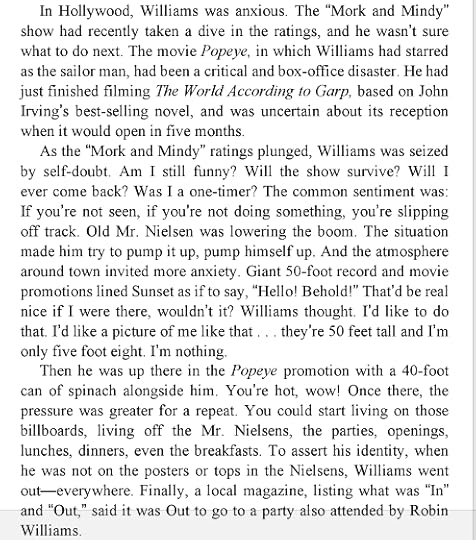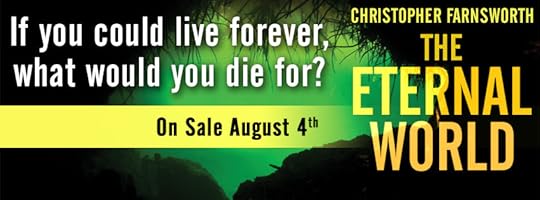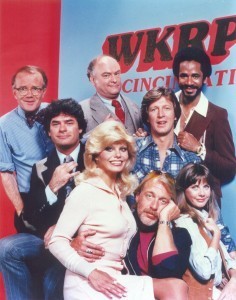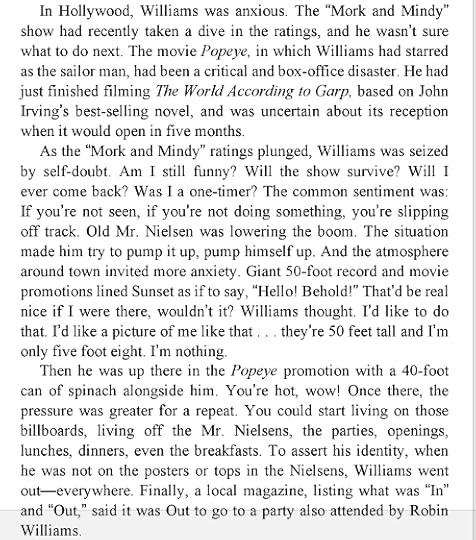Christopher Farnsworth's Blog, page 5
June 22, 2015
Signings
 Here’s a list of my upcoming signings for THE ETERNAL WORLD. If you’re close by, I hope to see you at one of them.
Here’s a list of my upcoming signings for THE ETERNAL WORLD. If you’re close by, I hope to see you at one of them.
Barnes & Noble in Santa Monica on August 4, starting at 7:00 p.m.
Mysterious Galaxy in San Diego on August 8, starting at 2:00 p.m.
Murder By The Book in Houston on August 11, starting at 6:30 p.m.
I’ll also be appearing at the Fall for the Book festival in Fairfax, Virginia on a panel with Suzanne Rigdon, Jenna Black, and Carrie Vaughn. I’ll post here when I have the specific time and date. And I will update with more events when/if they happen.
May 26, 2015
Kirkus Reviews
THE ETERNAL WORLD got a great review from Kirkus last week. You can read the whole thing here, but I’m pretty happy about these lines:
With cinematic pacing and colorful action scenes, Farnsworth blends a unique premise into fun summer reading. Michael Crichton’s gone, but Farnsworth entertainingly explores the border where science fantasy meets reality.
Yeah, I’ll be grinning about that for a while.
I also like what Tod Goldberg, author of GANGSTERLAND, said in response on Facebook:
I have read this book and can confirm Kirkus is not a bunch of lying motherfuckers.
So with endorsements like that, what are you waiting for? You can pre-order from your friendly neighborhood bookstore by clicking here, or from Amazon or Barnes & Noble.
May 11, 2015
Congratulations, Goodreaders
 Congratulations to the 25 people (out of more than 1,000 who entered) who just won free advance copies of THE ETERNAL WORLD from Goodreads and William Morrow. Hope you enjoy it.
Congratulations to the 25 people (out of more than 1,000 who entered) who just won free advance copies of THE ETERNAL WORLD from Goodreads and William Morrow. Hope you enjoy it.
April 22, 2015
Free Books!
 My publisher, William Morrow, is giving away 25 advance copies of THE ETERNAL WORLD through Goodreads. You can enter the giveaway here if you want to find out what happens long before anyone else even sees the novel. It will be like you’re a time traveler. Giveaway closes May 10, so enter now.
My publisher, William Morrow, is giving away 25 advance copies of THE ETERNAL WORLD through Goodreads. You can enter the giveaway here if you want to find out what happens long before anyone else even sees the novel. It will be like you’re a time traveler. Giveaway closes May 10, so enter now.
March 25, 2015
Library Journal
In case you missed it, the Library Journal has a nice write-up of my next book, THE ETERNAL WORLD, in its March pre-publication alert. You can read it here.
February 13, 2015
My David Carr Story
David Carr died yesterday. He was a great writer, a fearless critic, and by all accounts, a great friend and mentor.
I’m not going to say I knew him. There were a lot of people who did, including some friends of mine, and as Hamilton Nolan writes at Gawker, Carr apparently had the gift of making everyone feel he was their close personal friend.
He could also be incredibly kind to complete strangers. When I was a reporter just starting out at Boise Weekly, I sent roughly a million résumés out into the ether, looking for my next job. One of them went to Carr, who was then the editor of the Washington City Paper. (This was back in the previous century, before you could read any paper in the world on the Web. Alt-weeklies used to send copies to one another as a courtesy, and I remember how much I looked forward to tearing through the City Paper when it showed up.)
He was one of the few editors who called me back. Many smaller papers ignored me completely, but Carr took the time. As I remember it, he told me right off he wasn’t going to hire me. I needed more experience.
But he still spent an hour on the phone with a dumb kid in Boise, Idaho, giving me advice and encouragement, when he could have been doing literally anything else.
So like almost every other writer in the world, I am mourning Carr. There are a lot of great writers and outsized personalities in journalism. But he believed in the craft and the calling of the job, even now, when it looks more endangered than ever. And he was generous.
That’s so goddamn rare. And it just got a little bit rarer today.
My David Carr story
David Carr died yesterday. He was a great writer, a fearless critic, and by all accounts, a great friend and mentor.
I’m not going to say I knew him. There were a lot of people who did, including some friends of mine, and as Hamilton Nolan writes at Gawker, Carr apparently had the gift of making everyone feel he was their close personal friend.
He could also be incredibly kind to complete strangers. When I was a reporter just starting out at Boise Weekly, I sent roughly a million résumés out into the ether, looking for my next job. One of them went to Carr, who was then the editor of the Washington City Paper. (This was back in the previous century, before you could read any paper in the world on the Web. Alt-weeklies used to send copies to one another as a courtesy, and I remember how much I looked forward to tearing through the City Paper when it showed up.)
He was one of the few editors who called me back. Many smaller papers ignored me completely, but Carr took the time. As I remember it, he told me right off he wasn’t going to hire me. I needed more experience.
But he still spent an hour on the phone with a dumb kid in Boise, Idaho, giving me advice and encouragement, when he could have been doing literally anything else.
So like almost every other writer in the world, I am mourning Carr. There are a lot of great writers and outsized personalities in journalism. But he believed in the craft and the calling of the job, even now, when it looks more endangered than ever. And he was generous.
That’s so goddamn rare. And it just got a little bit rarer today.
August 20, 2014
The Love Song of Dr. Johnny Fever
Let me tell you why I love “WKRP in Cincinnati.”
I watched a lot of TV as a kid. A good four to six hours a day sometimes. Which is especially amazing when you consider how little there was, compared to what we have now. (Three channels. No TiVo. No cable. My daughters simply do not believe this was the way TV worked when I was a kid. My daughters thought that Spider-Man was a real person, but they don’t believe me when I tell them this.)
But “WKRP” still stands out in my memory, and not just because it was good.
“WKRP” was a mildly successful sitcom in the late 70s and early 80s about life at a struggling AM radio station in Cincinnati, Ohio. I got to see it both when it was first-run — my dad let me watch with him — and later, in syndication.
The show struggled to find an audience — it was moved around the schedule constantly — and was dissed by Mary Tyler Moore herself (“Let me put it this way: I wouldn’t watch it.”), even though her company produced it. CBS clashed with the series’ creators about the show’s direction, and it was canceled after four seasons.
Despite all that, the show produced some of the best television around at the time, including one legendary Thanksgiving episode. (“As God is my witness, I thought turkeys could fly.”)
“WKRP” is the spiritual godfather to workplace comedies like “The Office” and “Parks and Recreation” and “Scrubs” — a group of zany characters, all trapped in a zany place, doing zany things. Like so many other shows, it was about a bunch of lovable losers — and they were losers, there was no getting around that.
Andy Travis, the program director hired to turn the station around, was a success — and then he came to the lowest-rated station in a dead-end market. Dr. Johnny Fever was a big-time L.A. DJ once — and then he said the wrong thing on the air and was blacklisted in the business. Herb Tarlek is a terrible salesman and a failure even as a sleazy lounge lizard. Les Nessman, the station’s news reporter, can’t pronounce most of the names in his stories and is obsessed with hogs and communism. The station’s general manager, Arthur Carlson, only has a job because his mother owns the station.
They are all trapped together in Cincinnati. I know now that their sets were limited by the budgets and designs of TV at the time, but it really looked like they spent their time in an ugly office before going home to cramped, cheap apartments. I could picture them even when the camera was not on them, heating something out of a can, watching bad sitcoms from the couch, before shuffling off to bed and starting the whole process again in the morning.Their lives were lonely, and like most lonely people, they were weird and difficult and sometimes hard to like.
I suspect that’s what makes a show like WKRP so hard to make now. You saw glimpses of it in “Community,” but it’s very hard to sell a show about losers to a studio or a network or an audience. Real life deals enough of that to us.
Still, that’s nothing new. There are lots of characters like that on TV. But other shows invite us to laugh at those characters — that Michael Scott, he’s such a moron; that Kramer, he’s so weird; and so on. We get to look down on them, from behind a thick, protective coating of irony.
The characters at WKRP aren’t so easily mocked. (Aside from the fashions and music from thirty years ago, I mean.) They tried too hard, and there’s nothing that’s so repellent to ironic distance as actual effort.
Here’s a good example, from the first season — and one of my favorite episodes. WKRP sponsors a band called “Scum of the Earth” and it’s a disaster from the moment the exceedingly well-dressed men show up. After abusing and insulting everyone within spitting distance, they refuse to play. So Andy and Venus and (reluctantly) Johnny have to beat them up to get them onstage.
It’s probably the smallest joke in the whole episode. (Johnny’s weary sigh: “Rock and roll.”) But as a metaphor, it’s pretty perfect.
Everyone at WKRP knows, on some level, that they’re all stuck. They know they’re never going to make the real big time. The ones who were there before, like Andy and Johnny, know they don’t really belong.
But they never stop aiming for something a little better. Not too much better. They’ll fight for it. Literally, punch people in the head for it, if necessary, for reasons that aren’t too clear any more.
And most of the time, they still fail. We can laugh about it. They do. (Eventually. Usually.) But it’s hard to look down on them for that. It seems a little too close to what we all do every day. It seems like we all need to believe we’ve got a shot — or at least a sense of humor — or we wouldn’t get out of bed. Especially on those cold, gray, winter mornings in Ohio.
August 12, 2014
Robin Williams, RIP.
By this time tomorrow, there will be thousands of remembrances, and I am certain that adding mine to the pile won’t mean much. But I used to listen to “A Night At The Met” with my friends Randy and Joe the way other people listened to Bon Jovi. Comedians were my rock stars. Robin Williams was Springsteen.
Williams struggled with depression and addiction his entire life. There was never enough fame, never enough money, to heal that anxiety and insecurity inside him. This is from Wired, Bob Woodward’s biography of John Belushi, Williams’ friend. It’s 30 years old now, but it could have been written a week ago:

That’s the thing about working in what we call Hollywood, or anywhere in the arts: there is always the pressure to prove yourself, to perform again, to repeat the lightning-in-a-bottle trick you pulled off the last time. For some people, it is almost a physical weight, and it crushes them.
I’m not going to claim I have some special insight into what went through Robin Williams’ mind. This is just to say that I will miss him despite never knowing him, because I still have the greatest admiration for anyone who can be funny on demand, over and over. We need people who can make us laugh, and the world is missing another one today.
August 11, 2014
Robin Williams, RIP.
By this time tomorrow, there will be thousands of remembrances, and I am certain that adding mine to the pile won’t mean much. But I used to listen to “A Night At The Met” with my friends Randy and Joe the way other people listened to Bon Jovi. Comedians were my rock stars. Robin Williams was Springsteen.
Williams struggled with depression and addiction his entire life. There was never enough fame, never enough money, to heal that anxiety and insecurity inside him. This is from Wired, Bob Woodward’s biography of John Belushi, Williams’ friend. It’s 30 years old now, but it could have been written a week ago:
That’s the thing about working in what we call Hollywood, or anywhere in the arts: there is always the pressure to prove yourself, to perform again, to repeat the lightning-in-a-bottle trick you pulled off the last time. For some people, it is almost a physical weight, and it crushes them.
I’m not going to claim I have some special insight into what went through Robin Williams’ mind. This is just to say that I will miss him despite never knowing him, because I still have the greatest admiration for anyone who can be funny on demand, over and over. We need people who can make us laugh, and the world is missing another one today.






